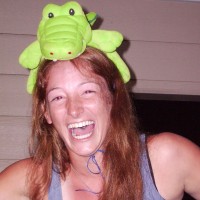Dominique McCowan
PhD Graduate
James Cook University

From 2005 to 2022, the main node of the ARC Centre of Excellence for Coral Reef Studies was headquartered at James Cook University in Townsville, Queensland (Australia)








Dominique grew up in southern Indiana, where she observed fossilized Devonian reefs. She went to a local college while working full-time and graduated with a BS in Biology with a minor in Geology and an AA in Chemistry. During her undergraduate studies, she was part of a field biology club, through which she experienced coral reef ecology and the ocean (for her first time when she was 18). She did research on mosquitoes and West Nile Virus for three years during her undergraduate course work, so Dominique is absolutely ecstatic about working with corals. She came to Townsville as soon as they accepted her for postgraduate work, and has completed her graduate diploma in marine biology. She is now undertaking her PhD, which focuses on the ecological and evolutionary vulnerabilities of scleractinian corals to mass bleaching events. Her supervisors are Dr. Morgan Pratchett, Dr. Andrew Baird, and Dr. Terry Hughes. In her free time, Dominique likes to be in or near water or doing something artistic.
New DNA techniques are being used to understand how coral reacted to the end of the last ice age in order to better predict how they will cope with current changes to the climate. James Cook Univer
A new study on the effects of climate change in five tropical countries has found fisheries are in more trouble than agriculture, and poor people are in the most danger. Distinguished Profess
James Cook University researchers have found brightly coloured fish are becoming increasingly rare as coral declines, with the phenomenon likely to get worse in the future. Christopher Hemingson, a
Researchers working with stakeholders in the Great Barrier Reef region have come up with ideas on how groups responsible for looking after the reef can operate more effectively when the next bleaching
Abstract: As marine species adapt to climate change, their heat tolerance will likely be under strong selection. Individual variation in heat tolerance and its heritability underpin the potential fo
Abstract: The Reef Ecology Lab in KAUST’s Red Sea Research Center explores many aspects of movement ecology of marine organisms, ranging from adult migrations to intergenerational larval dispersal
Abstract: Macroalgal meadows are a prominent, yet often maligned component of the tropical seascape. Our work at Ningaloo reef in WA demonstrate that canopy forming macroalgae provide habitat for ad
Abstract: Sharks are generally perceived as strong and fearsome animals. With fossils dating back at least 420 million years, sharks are not only majestic top predators but they also outlived dinosa
Abstract: Connectivity plays a vital role in many ecosystems through its effects on fundamental ecological and evolutionary processes. Its consequences for populations and metapopulations have been
Abstract: Evolution of many eukaryotic organisms is affected by interactions with microbes. Microbial symbioses can ultimately reflect host’s diet, habitat range, and even body shape. However, how
Abstract: The past few years have seen unprecedented coral bleaching and mortality on the Great Barrier Reef (GBR) but the consequences of this on biodiversity are not yet known. This talk will expl